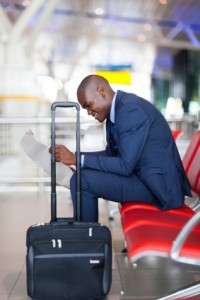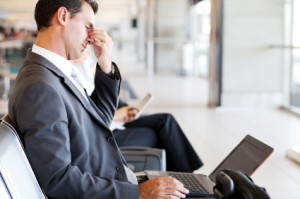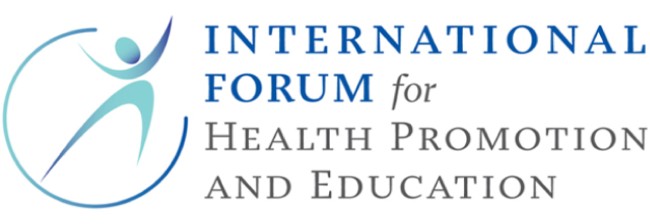According to a recent Harvard Business Review survey, business travel generates sales of up to 2000% ROI spent. Why? Because face to face meetings are extremely important to a business which according to an Oxford Economics survey a staggering 25% of customers and 28% of revenue is lost to competitors when a physical presence is not achieved and the conversion rate of prospective customers more than doubles with face to face visits.
Unfortunately, business travel is also positively linked to stress experienced by staff. Hardly surprising when business travel is usually accompanied with companies attempting to increase their return on investment by managing travel expenditure through various travel policies and procedures. At the same time, they may have high work expectations such as increasing the number of client meetings during a trip to spread the cost, or a return to work immediately post long haul travel.
Surprisingly, neither the frequency or duration of business travel scores the highest intensity of stress experienced by those travelling! The Harvard Business Review survey with circa 7500 business executives found one of the four most powerful stresses experienced during business travel is delay or layovers and it ranked as a ‘very high stressor’.
Often the stress experienced by the delay is heightened by loss of time and the resultant inability to focus on work during delayed trips, especially if necessary to prepare for a meeting when in a busy confined space or poor internet connections while in transit.
Equally surprisingly is a perceived limitation on being able to exert healthy coping behaviours, such as not being able to eat healthily, also rated as a high stressor and among the top ten travel stressors, or maintaining an exercise routine when travelling for several days.
So what can a busy executive do to cope when faced with delay and disruption? After all, there is only so much your company travel policy currently allows to relieve some of the strain.
Problem solve
Naturally, the first task is to problem solve as much as you can. You can’t control delay caused by other people’s actions or unforeseen incidences such as bad weather, accident etc. But you can help yourself by evaluating how your travel plans will be affected as a result and explore any feasible solutions.
Ascertain quickly the likely length of delay. Depending on the length of time involved, you might find it more beneficial to return to work and/or home, or if you are in transit you may need to consider making alternative transport and/or accommodation arrangements.
Reroute where possible.
Look for other transport options if your trip has been delayed due to mechanical, natural disaster or other problems.
Or better still ask your company travel representative or an administrator /colleague in the office to assist you. Spreading the task helps to rebalance the strain you may encounter as a consequence of the delay.
Find an alternative quiet space to conduct a telephone conference or virtual face to face meeting.
Don’t even attempt to undertake a telephone conference while in queue or crowded dining area! Not only should your business remain confidential, but background noises and interruptions may damage your professional credibility with a client and/or colleague. It simply isn’t worth the extra strain that it can impose on yourself, your contact(s) on the other end, and others attempting to get your attention at the terminal.
Instead, ask for a quiet location, such as a business lounge. Generally, there is a charge, although some transporters include such facilities in their price, while some membership organisations such as the Institute of Directors include this as a member benefit. Some companies might even be prepared to reimburse you for the expenditure.
Some airports, such as London City Airport, now operate a quiet policy, where only emergency announcements are made. So finding a quiet space might be more feasible at an airport geared towards business travellers than the larger more busy airports/terminals.
Make use of your time productively.
Travel delays are often perceived as a waste of time. According to the Harvard Business Review, this is a major stressors for travelling executives and sales representatives. Stress levels peak when travelling business people are in a situation which makes it difficult or impossible to work eg the lack of internet connection, infeasibility to use laptop.
 Always carry a back up mobile internet connection. Not only may there be security issues with public Wifi access, but this will provide you with some control over connecting.
Always carry a back up mobile internet connection. Not only may there be security issues with public Wifi access, but this will provide you with some control over connecting.
Make sure you have downloaded appropriate apps on your smart phone to work with while you queue or wait for your next connection. This way you can either use the public WiFi or your telephone supplier network.
Always carry good old fashion pen and notebook. Good old fashion lists or brain storms on a new or on going project can be used as some quality thinking time away from normal work/office interruptions.
‘Reframe’ your schedule
‘Reframing’ the prospect of a long delay is a very effective coping mechanism. If you perceive the delay as inconvenient or a nuisance, then this perception will make the strain you are experiencing on your journey even worse.
By changing your perception to one where you can use the additional or newly perceived ‘bonus’ time as an opportunity to relax, work productively or even try something new as a work-life balance opportunity, then the strain you may experience will have lesser impact. Sample a new cuisine, send postcards to loved ones, prepare for a meeting or even catch up on some administration tasks that you’ve been putting off such as clearing out your email inbox, are positive actions which can help clear the mind.
Gain some social support for your plight.
 Let them know at your office that you may be stuck. Even if it is a little delay, support can only be awarded when information of the challenge you are facing is known. Let them know at home that you may be late to your destination and the reasons why. This way you will prevent yourself becoming anxious over your loved ones worrying. And if this isn’t likely, at least they will offer sympathy and you can quickly remind them you miss them.
Let them know at your office that you may be stuck. Even if it is a little delay, support can only be awarded when information of the challenge you are facing is known. Let them know at home that you may be late to your destination and the reasons why. This way you will prevent yourself becoming anxious over your loved ones worrying. And if this isn’t likely, at least they will offer sympathy and you can quickly remind them you miss them.
And if this isn’t possible, then maybe it’s about time your social skills were dusted off by striking up a brief conservation with someone else in the queue. A little kindness can go a long way and small collaborative chat can make travelling wait less horrendous.
Talk to other passengers about positive things. Acknowledge their plight as well but gently remind your fellow passenger that worrying won’t improve the situation.
Remember to indulge your healthier coping behaviours
Remain hydrated – At the first sign of delay, fill your water bottle or grab a non-alcoholic refreshment. Drink little and often to avoid becoming dehydrated later.
Healthy snacks – Often food at terminals during severe delays runs out, short flights may not serve food, and food on your chosen mode of transport may not be something you actually desire. With a long wait ahead of you or further delays due to connection disruption, the last thing you need is a hunger inspired meltdown later.
 If you haven’t brought some snacks with you, then purchase a range of healthy snacks as soon as possible. Fresh fruit, nuts, cheese and crackers, washbi beans, a light sandwich are all easy options that you can eat while you wait.
If you haven’t brought some snacks with you, then purchase a range of healthy snacks as soon as possible. Fresh fruit, nuts, cheese and crackers, washbi beans, a light sandwich are all easy options that you can eat while you wait.
Move it! Don’t just stand there! Move! When stuck in a queue or sitting waiting for your flight/train or boat to be called, your weight is either pushing down on your ankles or your circulation is working harder.
Moving your ankles, shifting your weight and walking around (even if in circles) will assist both digestion and circulation.
This is particularly important if you are waiting to embark on a long haul flight or train trip where the risk of DVT is greater as sitting for long periods increases the risk for blood clots.
When sitting, pump your calf muscles by pushing down with your toes and lift your heels 5 to 10 times per hour.
To avoid back, neck and leg pain, practice sitting which allows your bones, instead of your muscles and ligaments, to support you body. Make sure you distribute your weight evenly over your pelvic bones. Don’t cross your legs. Keep your shoulders and abdomen relaxed.
If you are travelling by car, turn on the seat warmer and adjust your seat to support your back and neck.
Take advantage of offers from your travel companies and travel insurance.
Call your companies travel agent/company representative used to book your trip. Your travel agent/company representative might have access to more information than you do, and can get you re-booked more quickly on another flight or in a preferred hotel over night.
You may be entitled to compensation for long unexpected delays. Always carry the insurance policy within your hand luggage. Even the most basic travel insurance policies usually offer compensation for delay to cover the cost of subsistence, accommodation etc.
Find out what you are entitled to and help it as a way to relieve the tension during such challenges in your business life. Don’t let the delay spill over into your work-life balance as well or your well-being and/or productivity during work hours will suffer, take advantage of what your coverage includes.
Acceptance – ask for refund and reschedule your meetings.
People understand travel issues. It’s not the end of the world, and acceptance that things may be out of your control is another very effective coping mechanism. So work out quickly if it is better asking for a refund and arrange to do a telephone conference at the pre-schedule time with your business connection or client. If this is feasible, you can ask the airline, train or ferry operator for a refund.
© Extravitality 2014





























